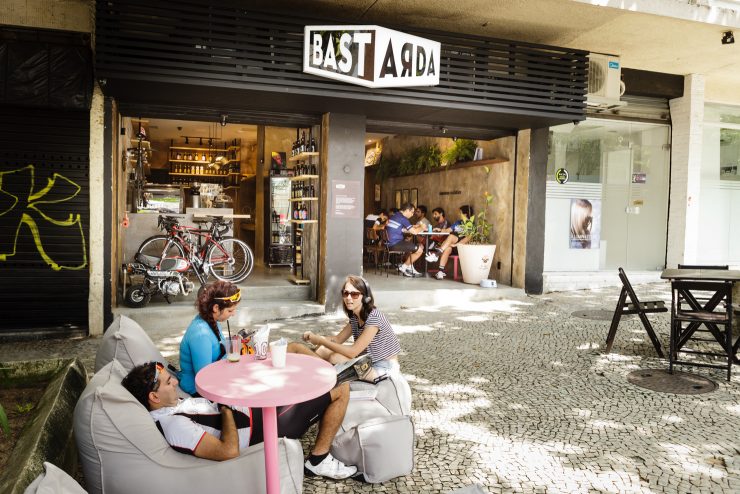
Marcos Leta is not your typical entrepreneur. One day, back in 2007, when he was having fresh juice at one of the many juice bars in Leblon, Rio de Janeiro, he got puzzled and wondered why, in a tropical country like Brazil, we did not have any 100% natural, additive-free juices on grocery shelves. After two years of research, he quit his financing career and founded the juice brand Do Bem, framing the tie he had to wear in his previous job and mounting it on the wall of his new office. Do Bem prides itself in offering only natural juices (no preservatives), and now has expanded into the cereal bar business.
Years later, inspiration struck again. Walking with his dad, Marcos Leoni, in their family farm, Leta noticed some old bikes and motorcycles that had been forgotten in the barn. They started thinking how easily we dispose of old/broken tools to get new ones, probably manufactured far away and not made to last long. They began to refurbish these bikes and soon started looking for a place in Rio that could serve as a hub for biking enthusiasts. They found the perfect spot close to the Horto region in the Botanical Garden of Rio—54 hectares of preserved green area inside the city. This is where most bikers in Rio do their daily training—including Leta, who rides about 35 miles a day.
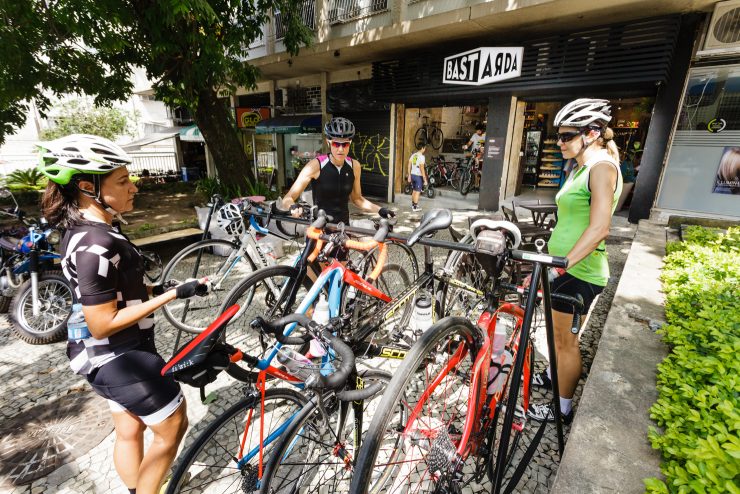
Bastarda, as the Portuguese dictionary defines it, is the crossing of different species. Leta explains they are working under three pillars: innovative bike clothing and gear targeted at Rio’s hardcore bikers; specialty coffee—since coffee and bike cultures are so close, and there is a huge gap in Rio; and also a gathering place for stories to be shared. Leta eagerly defines Bastarda as an uncommon cycling community, a fraternizing spot in the heart of Horto.
Leta acknowledges the uniqueness to his shop, “It might seem crazy,” he says, “but all the dishes from Bastarda were sourced from antique shops in Copacabana.” His intentions are to bring life to the old and to bring eclectic pieces together. In fact, the chair I was sitting on while doing the interview was originally from a hospital, which could be creepy to some (including me, now that I’m thinking about it) or intriguing to others. Tables and chairs don’t match, some of the benches were built using road rocks, and the sparse decoration mixes antique and modern. On the wall, pictures pay homage to world-famous cyclists. Bastarda sells merchandise with its logo, which was designed by Breno Pineschi of Hardcuore agency, including a cutting-edge lightweight compression polyamide jersey, aimed to improve biking performance.
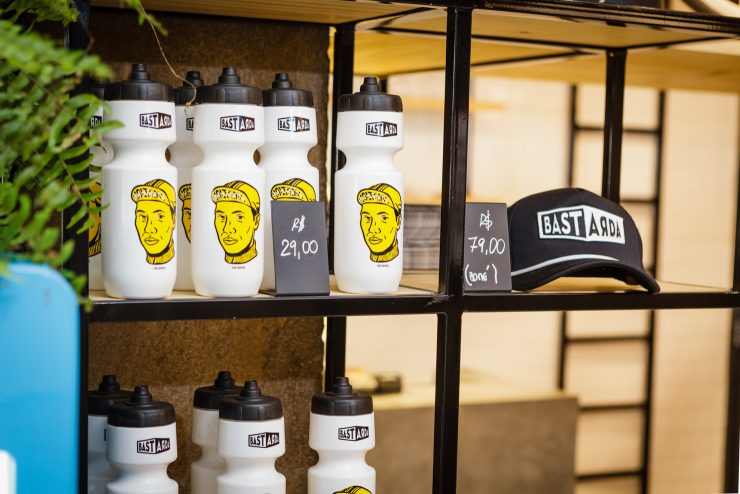
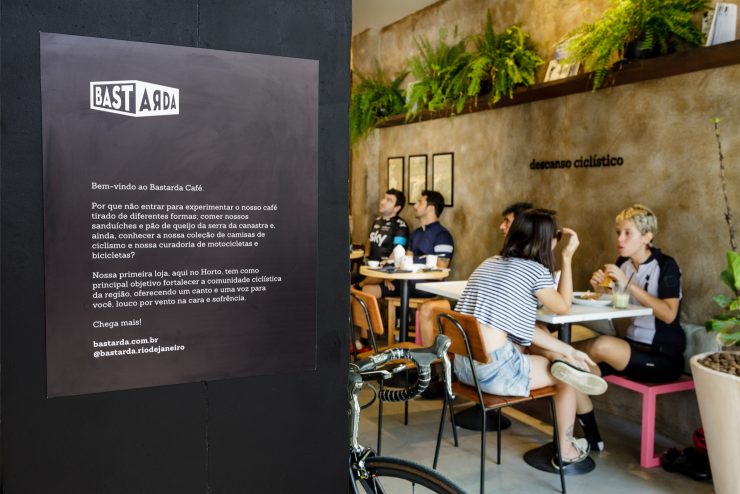
The features of the cafe were idealized with the help of Ton Rodrigues. Rodrigues also produces the True Coffee cold brew bottles that are being sold at Bastarda. Rio’s warm temperatures and cold brew coffee are indeed a match made in heaven. Leoni and Leta wanted to offer traditional Brazilian coffee drinks like the carioca—an espresso diluted with a bit of hot water—but with carefully sourced beans. That translated into a medium-to-dark roast blend of Yellow Catuaí and Yellow Bourbon from a farm in Patrocínio, Minas Gerais. Cariocas, Rodrigues explains, don’t taste good with too much acidity in a cup, so they chose to start safe with a nutty, bold cup. Eventually, lighter roasts will also be offered as pour-over.
In order to introduce the Rio folks to extraction methods beyond espresso, Bastarda serves French press, Clever Dripper, Chemex, V60, syphon and AeroPress as well. Rodrigues says he has instructed the baristas to always suggest one of these methods whenever a client orders a carioca. “They might actually be looking for something else but just don’t know how to order,” he speculates.
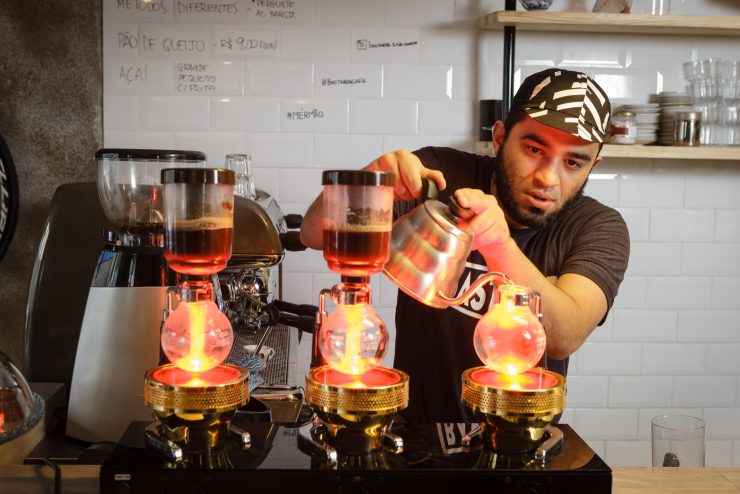
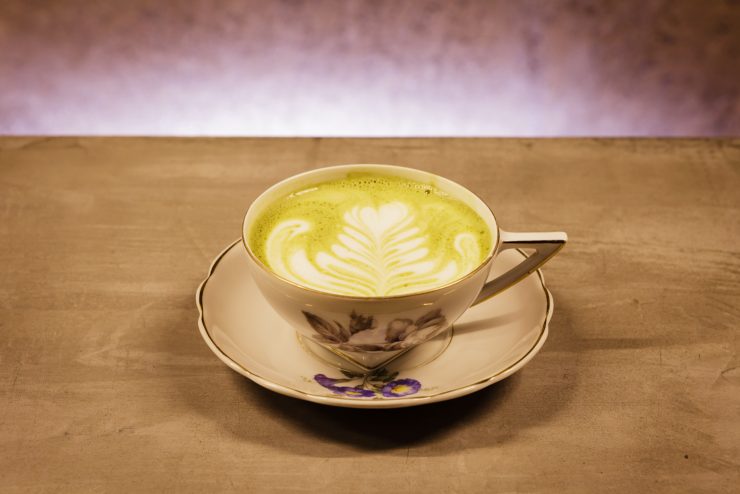
On the drinks menu, a highlight is the matcha latte. The same organic ground tea that is used as raw material for Do Bem’s bottled matcha tea is used at Bastarda in the matcha latte. As a third source of caffeine, there is also Do Bem’s ice cold mate, a yerba mate drink made with lime juice and a tiny bit of sugar, very refreshing and largely sold by street vendors throughout Rio beaches. The rest of Do Bem’s fruit beverages, needless to say, are also available at the shop. A lot of riders will want a beer after their training and Bastarda offers a good variety of craft beers from Rio de Janeiro.
To eat, Bastarda is offering a variety of to-go salad cups, crafted sandwiches, and one of the best pães de queijo I have ever tried in Rio. Believe me: there was real curated Serra da Canastra cheese in there. And I know my stuff—I was born and raised in the countryside of Minas Gerais, where it was invented. Pão de queijo and pour-over coffee may be a match made in heaven.
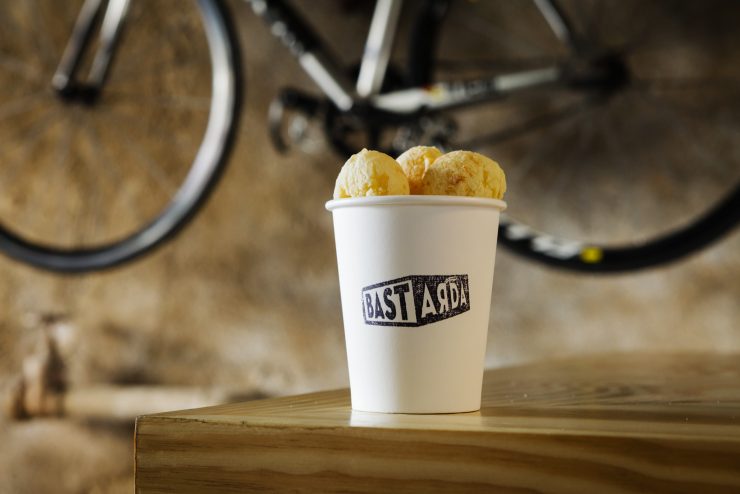
Bastarda has carved a unique niche: they sell loose fruits, bananas, and apples (something not common in Brazil)—a real helper if you are on your way to your training and need some quick energy. And on a major thoroughfare near the botanical garden, the shop also draws a lot of foot—not bicycle—traffic from intrigued passersby, as well as local workers. Leoni explains they are still experimenting with the menu items, as well as trying to get a good sense of their clientele. In the meantime, Bastarda will also host events for the biking community such as airing bike races inside the shop. After spending an evening at Bastarda and observing the community already being created around it, I can definitely attest that coffee and biking bring people together.
Bastarda is located at Rua Von Martius 325, Loja F/G, Jardim Botânico, Rio de Janeiro. Visit their official website and follow them on Facebook and Instagram.
Juliana Ganan is a Brazilian coffee professional and journalist. Read more Juliana Ganan on Sprudge.
Photos courtesy of Cicero Rodrigues.
The post In Rio de Janeiro, A Hub For Coffee, Bikes And Beer At Bastarda appeared first on Sprudge.

